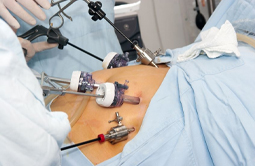
Get Free Treatment Plan From Top Hospital
Attach Medical Report
Bariatric Surgery in India

In the event that you are a non-Indian resident in need of the most qualified bariatric surgeon in India who is able to provide you with excellent treatment at a cost that is affordable to you, Al Afiya Medi Tour is here to assist you. We are a well-known medical tourism organization that is affiliated with a number of hospitals and maintains relationships with a large number of recognized doctors. As a result, we are able to provide the most effective bariatric surgery in India. Our seasoned professionals are standing by to provide you with a hand in establishing that connection. Al Afiya Medi Tour provides all the information you want in order to learn about the professionals that work in their area.
You may schedule an appointment online with one of the best physicians for Bariatric Surgery in India, whether you live in Faridabad, Delhi, Gurgaon, Noida, Chennai, or Mumbai. Our team is comprised of professionals that not only have extensive training but also a great deal of experience in their fields. These experts are accessible to you every hour of every day, seven days a week, and they offer comprehensive assistance that encompasses every facet of all of your medical requirements and crises. Beginning with providing treatment-specific estimates from the leading hospitals and physicians, completing visa arrangements, making arrangements for stay in India, maintaining continual interaction with the treating doctor and hospital, and being in regular communication for post-treatment feedback are all steps that are included in this process. Our team provides you with all of the information you need to know about the best bariatric surgeon in their field.

When it comes to selecting the most appropriate bariatric operation, the choice of hospital in India is an extremely important one. It is quite likely that you will be perplexed as to which hospital you should go to, and this is especially true if you do not normally dwell in India. Al Afiya Medi Tour, we adhere to the philosophy that we should provide our patients with the highest possible level of medical care and medical expertise at prices that provide the possible value for the money spent by the patients. We offer our clients a broad selection of both surgical and non-surgical treatment options, all of which are derived from renowned facilities in India.
Those that work with us are experts in their fields, and they are all highly certified and experienced. These medical experts are on call around the clock to assist you with any and all of your medical requirements and emergencies. They are here to help you. Al Afiya has partnered with a number of hospitals that are widely recognized as being among the best in their fields. This is not only extends the extent of our skills but also provides patients with a range of alternatives to choose from when it comes to their treatment at costs that provide an exceptional value for the money that is spent.
Book An Appointment for Bariatric surgery

Get Free Treatment Plan From Top Hospital
Attach Medical Report

Patients from any country may afford treatment in India, making it one of the world’s fastest-growing medical tourism destinations. You need to be aware of the cost of bariatric surgery therapy in India if you are considering getting treatment for obesity via bariatric surgery in India. The price of bariatric surgery therapy or surgery in India varies considerably from one hospital to another, as well as from one location to another, and it also is contingent on the doctor’s charge. In India, the price of weight loss surgery comes to an average of 2,93,000 Indian Rupees. In India, the bariatric surgery cost in India may go as high as Rs 5,00,000.

Bariatric surgery success rate in India is very excellent. Although success rate depends on various factors such as hospital, doctor, patient, and many more. You can consult online with our healthcare professionals to know the success rate of Bariatric surgery in India.
Contact Form
Attach Medical Report
Top Doctors & Surgeons in India
Why Choose Us

Personalized Care
24x7 Supports
Top NABH and JCI accredited Hospitals
Free Cost Estimation & Medical Opinion from Specialist
Get Free Tele/Video Consultation
Visa and Traveling Assistance
Post-surgery with Assistance in Follow-ups














